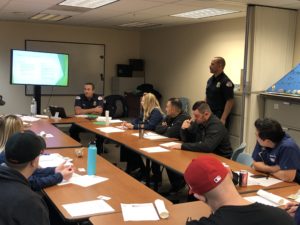 Have you ever asked a firefighter, “What is the worst call you has ever been on?” Don’t! Your well-meaning question is like asking them to flip through the mental files of incidents they are trying to heal from. And as the memories flood back, they’re also thinking, “How can you possibly understand how bad ‘the worst’ really is.”
Have you ever asked a firefighter, “What is the worst call you has ever been on?” Don’t! Your well-meaning question is like asking them to flip through the mental files of incidents they are trying to heal from. And as the memories flood back, they’re also thinking, “How can you possibly understand how bad ‘the worst’ really is.”
The answer you’ll get isn’t really want we want to talk about. The story you’ll hear is being retold simply to appease you.
That is why, when members of the Long Beach Fire Department (LBFD), in California, took Mental Health First Aid in 2016, we saw that we not only need to rethink how we address the mental health and substance use needs of community members when they call for help; we need to address our own mental health. With that in mind, we committed to train more staff in the program.
The first part of the training began in 2017 when some of us became Instructors in Mental Health First Aid for Public Safety. We started by teaching the course internally and then began to recruit classes. Throughout the course, we Instructors were amazed by the level of interest from our colleagues who attended.
So, while we started the program with an external focus, we found there was another focus group that we needed to address – our fire department personnel. We needed to focus internally. The fire service as a whole has been suffering silently for years. Formalized training to address the behavioral health issues that haunt the men and women of the fire service is long overdue.
It was almost as if the National Council for Mental Wellbeing heard what we were thinking, because very shortly after we started our training, the Mental Health First Aid for Fire/EMS module was announced and we were on our way to Washington, D.C., to take the Instructor training. The course provided an atmosphere to discuss the issues that affect us internally. Issues that have existed for years and were not addressed for multiple reasons.
First, and probably the greatest reason firefighters don’t discuss mental health is because of stigma. As a firefighter, you are expected to be strong, smart and virtually unbreakable. A behavioral health disorder does not fit this mold. This stigma needs to be broken. Second, we are a unique and close family that stretches from coast to coast. To be successful, we need to address our family’s needs from the inside.
Mental Health First Aid for Fire/EMS gave us the tools to have important first conversations internally and, if needed, know when to refer our brothers and sisters for professional help. Going forward, we are excited that SAMSHA has provided a grant that will allow us to train every member of the LBFD and to also invite members of other local area fire departments to take the course. LBFD Fire Chief Mike Duree has made the training a requirement of every LBFD member and it is now part of our fire recruit class curriculum. Certification in Mental Health First Aid for Fire/EMS is mandatory once you’re a member of LBFD. And we believe we’re a healthier, more effective force serving our community because of it.
Joel Davis and Justin Verga are Mental Health First Aid Instructors and firefighters/paramedics on the Homelessness Education and Response Team for the Long Beach Fire Department.